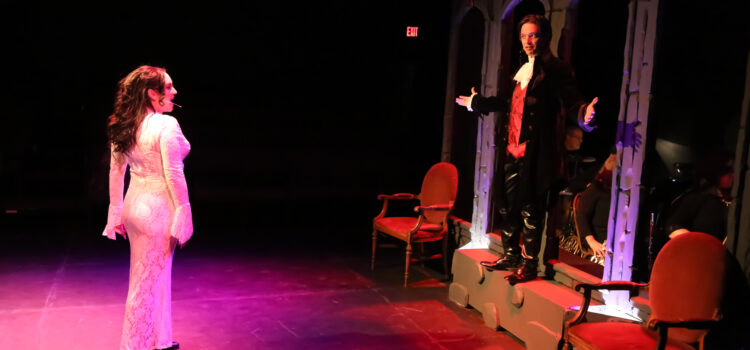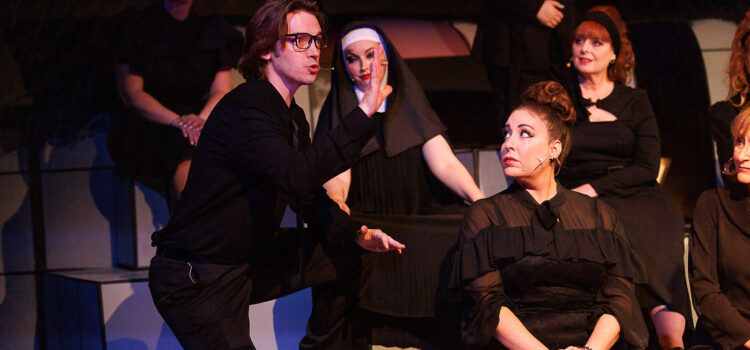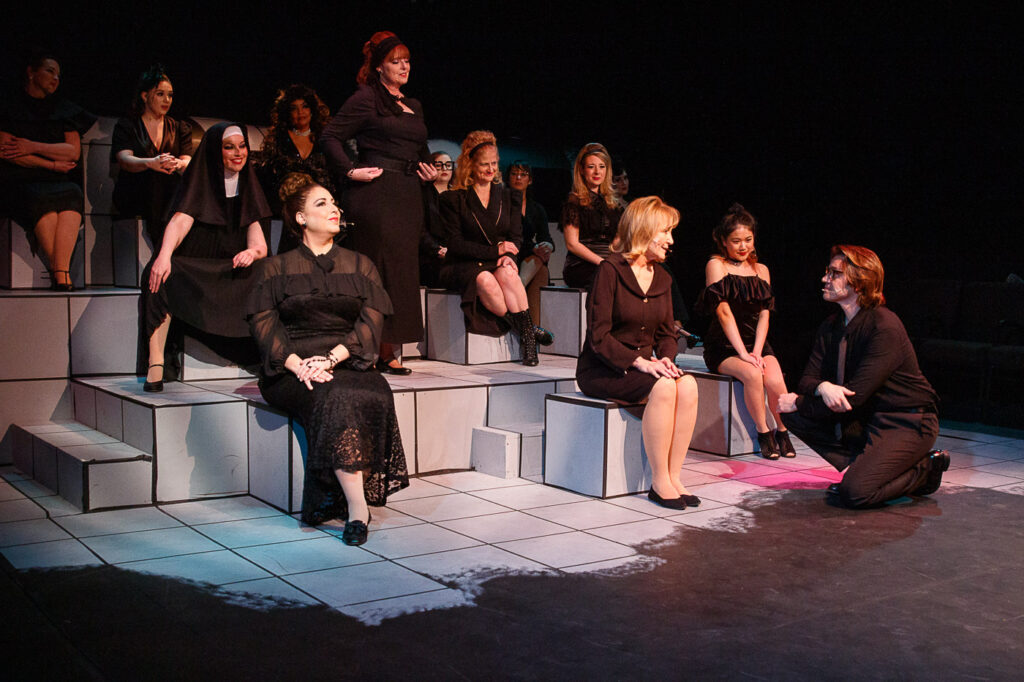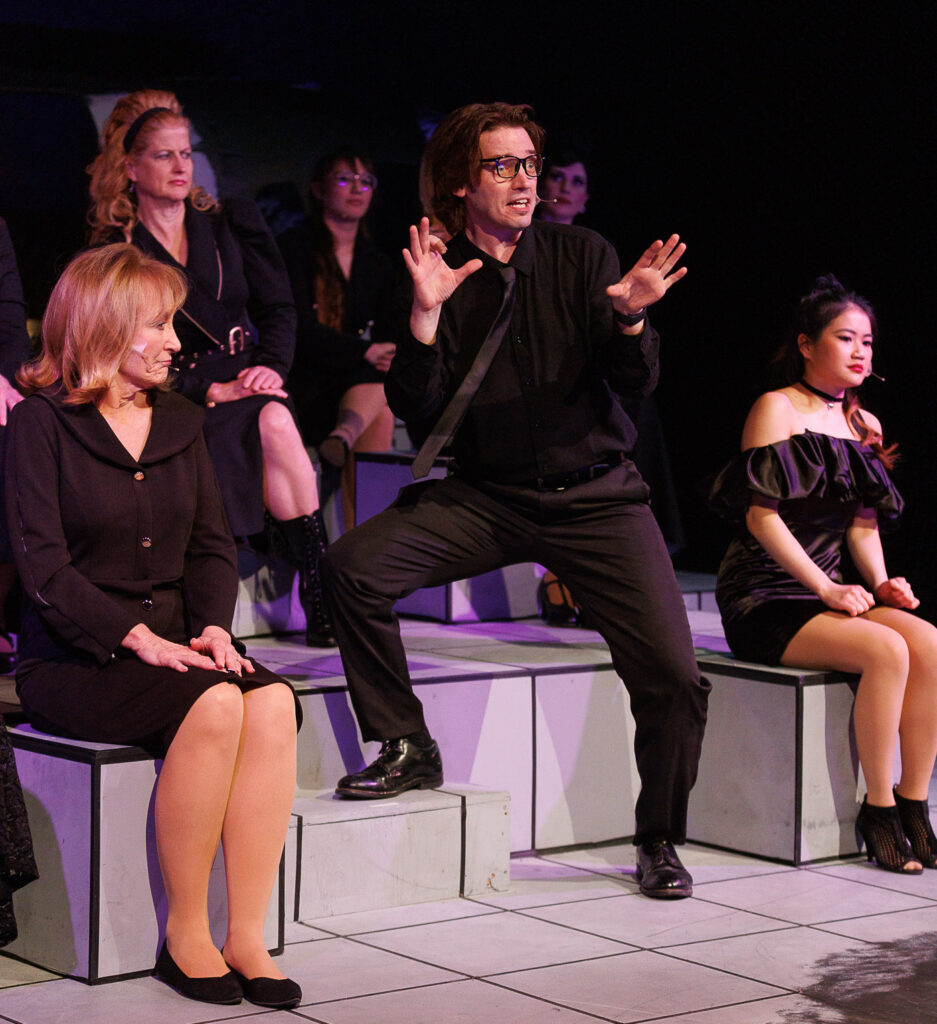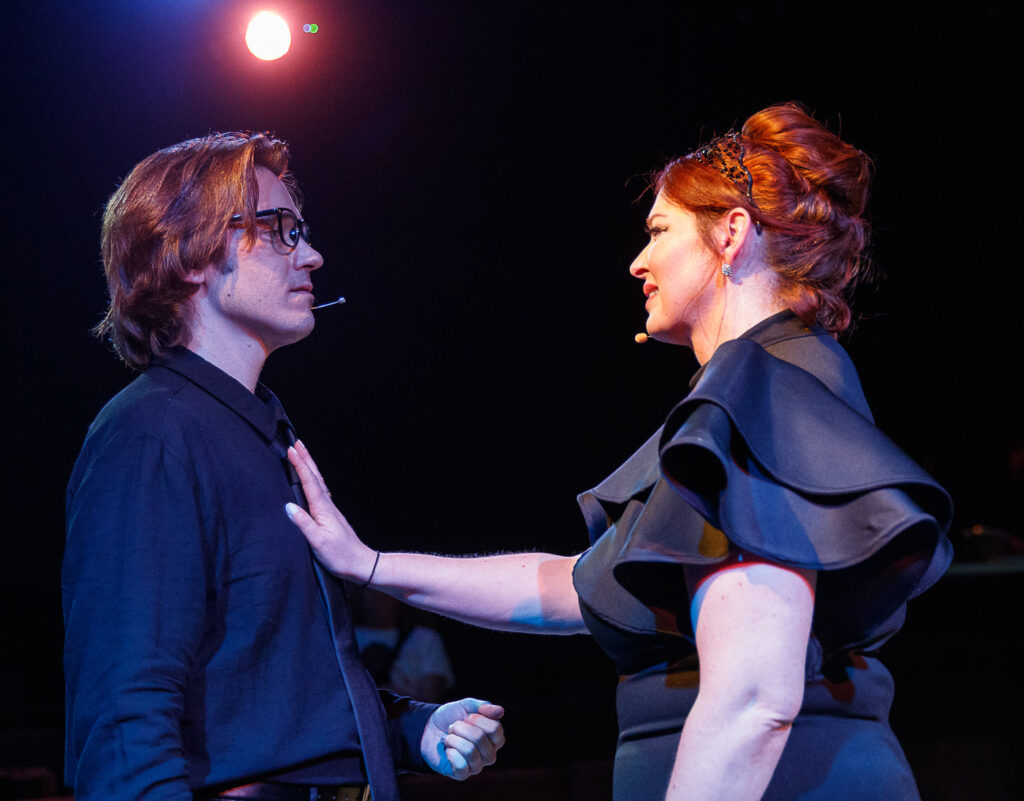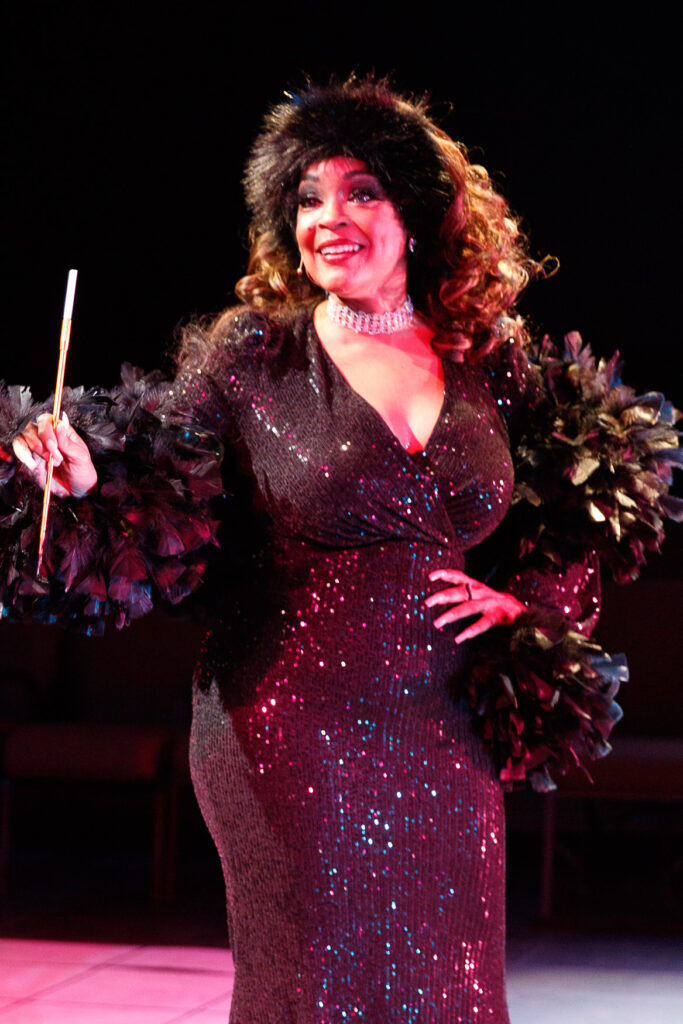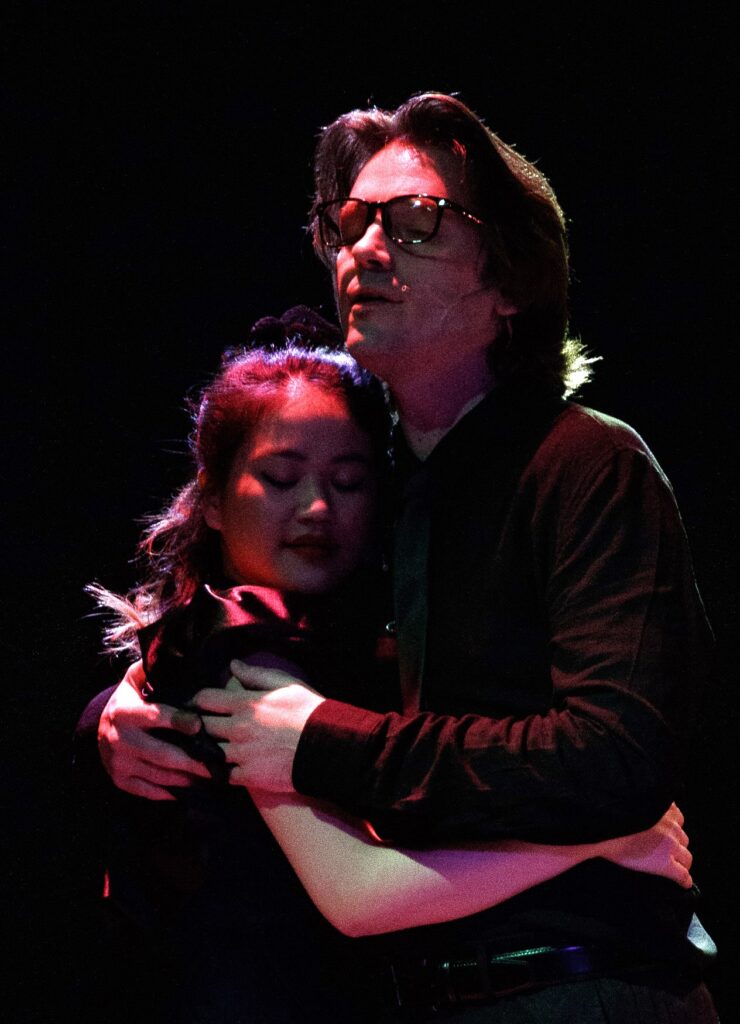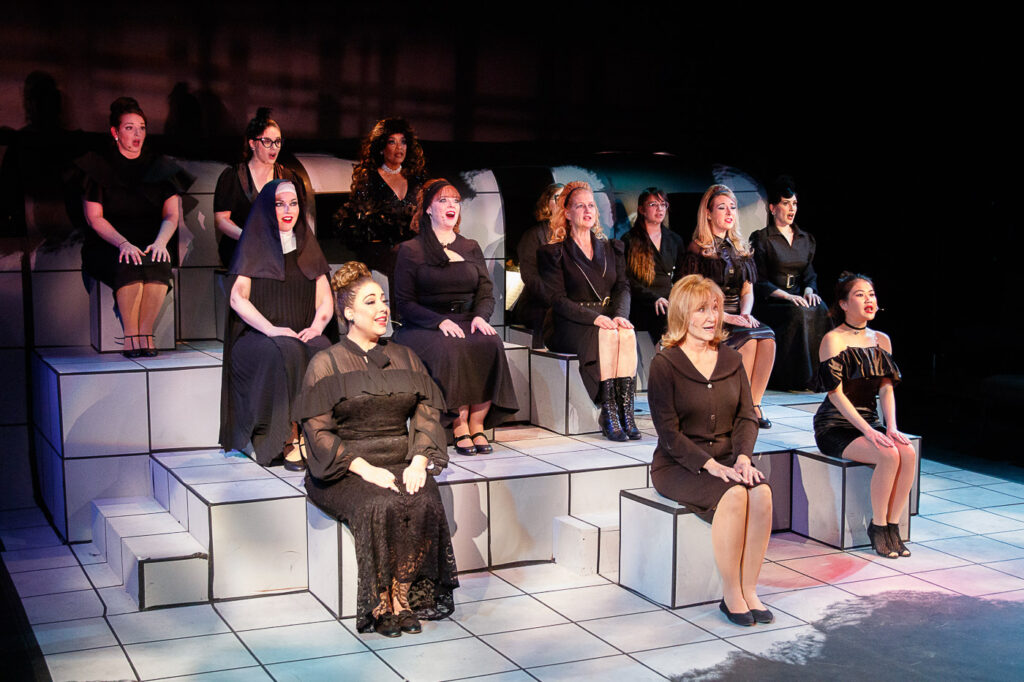By Lynn Venhaus
The children of the night are making some lusty music in the musical “Dracula,” a different take on the gothic horror classic whose folklore has become a pop culture staple.
Lush voices soar in a foreboding dark shadow setting, with New Line Theatre putting their own stamp on a stripped down, impressionistic version of Frank Wildhorn’s much-maligned 2004 Broadway musical that has since been heavily revised and became a hit overseas.
Of the many variations of Bram Stoker’s 1897 horror fantasy novel, this very dramatic musical version combines alluring romance with an unsettling thriller narrative devoid of any humor or camp, which has been easy to slide into with vampires over the years. (Case in point: “What We Do in the Shadows.”)
However, Chris Strawhun amuses as one of the characters, a straight-talking Texan named Quincey Morris while delivering his good ol’ boy dialogue.
This tight-knit group, of both familiar and fresh faces, is committed to getting the tone and tempo right. They strive to convince in their portrayals as either under Dracula’s hypnotic spell, resisting it, or desperate vampire hunters.
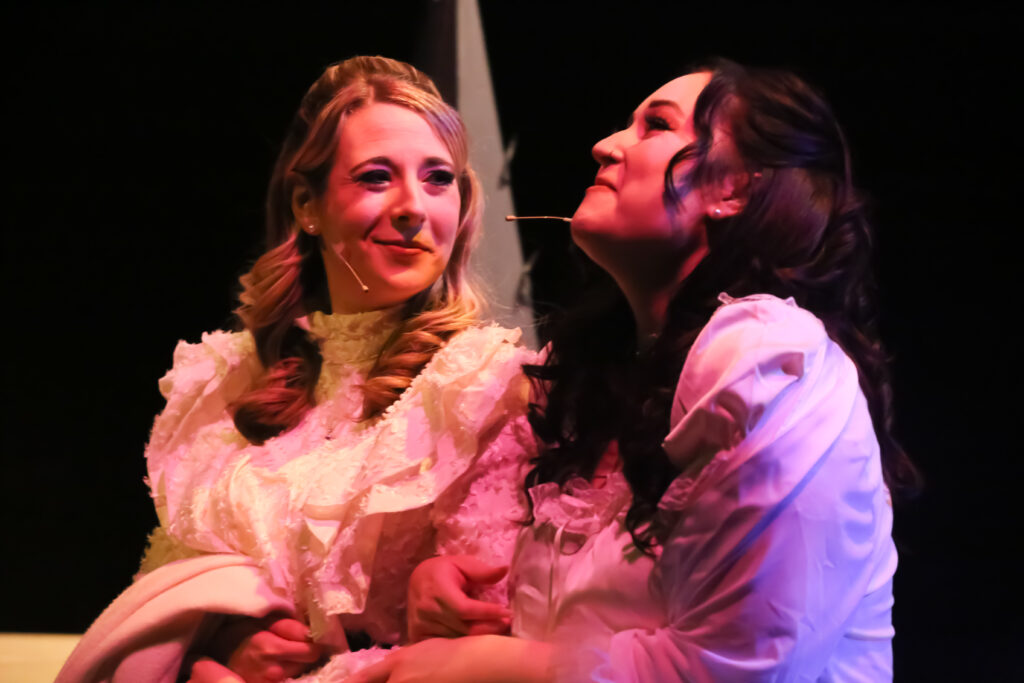
Their vocal prowess is its strongest suit because this show’s intention is to have more of an emotional core, not aiming to scare or even conjure suspense, in this supernatural world.
Supporting players circle the bewildering nobleman, Count Dracula, an imposing yet enigmatic figure confidently played by Cole Gutmann.
He has summoned solicitor Jonathan Harker (Ian McCreary) to assist in the purchase of a home in England.
Despite being told not to wander around the castle in the Carpathian Mountains, Harker does just that, encountering the Weird Sisters, a trio of nubile undead, who entice him to do bad things. McCreary presents the character as a stand-up guy, but weak.
Ann Heir Brown, Chelsie Johnston and Sarah Lueken bewitch as the seductive trio, slithering around the minimalist stage. With sinful looks and slinky attire, the characters add a provocative edge. They are choreographed by co-director Tony L. Marr Jr.
They initially set the eerie mood with the opening number, “Prologue,” then join McCreary in “Jonathan’s Arrival.” All three have melodic voices, evident on “Forever Young” and joining Guttmann on “Fresh Blood.”
Well, that situation doesn’t go well for Harker, and he winds up in a hospital. His smart and lovely fiancé Mina Murray (Brittany Kohl) changes her holiday plans with best friend Lucy Westenra (Vanessa Simpson) and leaves Whitby Bay, a seaside town in England.
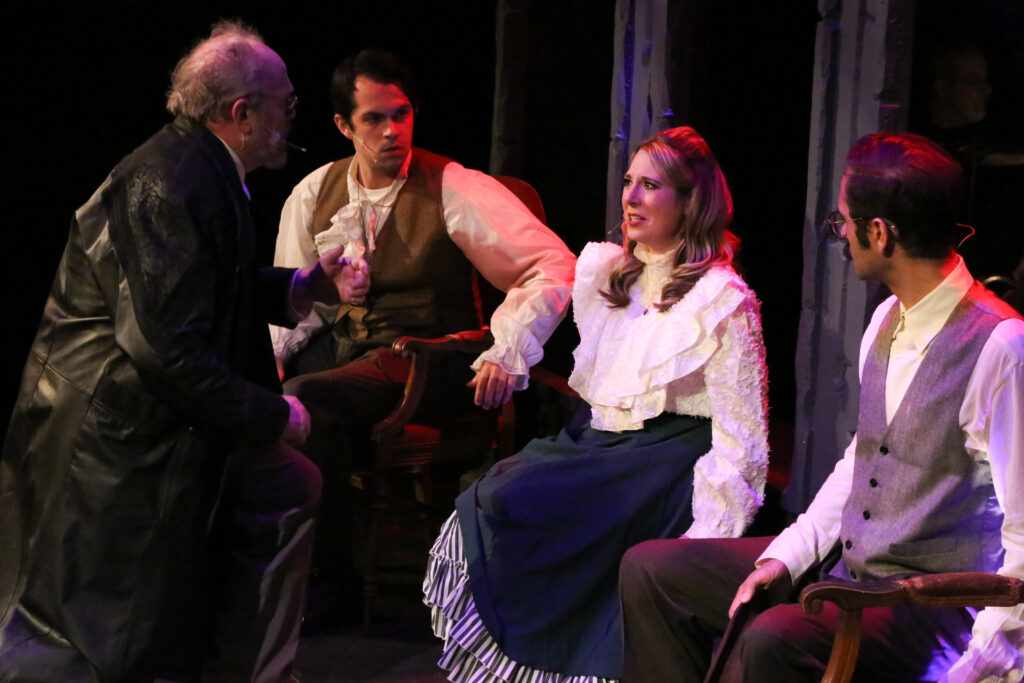
A sense of dread surfaces in Mina and Lucy’s duet, “The Mist,” and their nightmares begin.
The women, confined to the society standard of being an adornment on the arms of successful men, keep ignoring red flags but this mysterious aristocrat has captured their fancy. Kohl and Simpson are believable as women who may want more out of life.
The fetching Lucy, wooed by three men, chooses the dullest guy to marry, Arthur Holmwood, earnestly portrayed by Alex Vito Fuegner. Another suitor is Jack Seward, a doctor specializing in psychoanalysis, who is played with authority by J.D. Pounds.
Their number, “How Do You Choose?” sets up their relationships. Despite Lucy marrying Holmwood, the guys are friends and factor into the group trying to protect everyone from sinister forces.
Seward is the gateway to his patient, the insane assistant Renfield (Rafael DaCosta), who is mind-controlled by the count.
DaCosta and the Weird Sisters collaborate on “The Master’s Song,” indicating their servitude.
DaCosta adds some verve to the proceedings, as does Kent Coffel as Professor Abraham Van Helsing, the obsessed vampire slayer. Sporting a Dutch accent and explaining how to snare a vampire, Coffel grounds the show as the iconic presence.
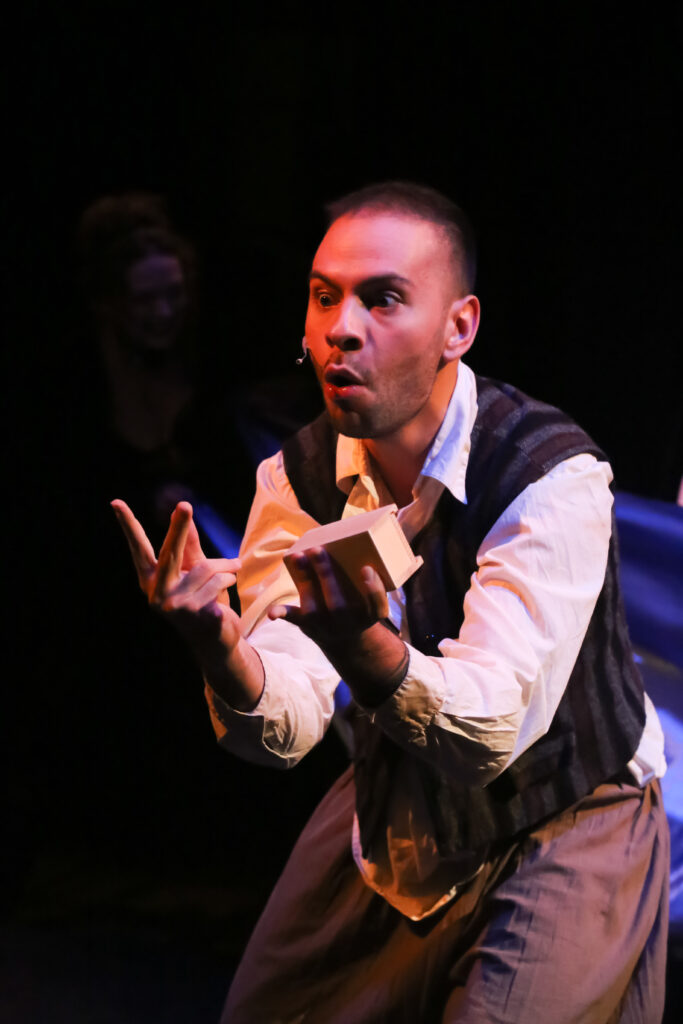
Coffel, an MVP in supporting roles, has more contributions musically — two solo numbers, “Nosferatu” and “Summers Come, Summers Go,” and performs “Undead One” and ‘Deep into the Darkest Night” with the suitors. Van Helsing also duets with Dracula in “It’s Over.”
This production focuses on the seriousness of the times, and the traditional roles in Victorian society. Stoker’s aggressively sexual characters were a novel idea in that era, for polite society followed rigid rules of decorum.
Flirting with forbidden eroticism has always been an appealing aspect of the mythology – and if you’ve seen Francis Ford Coppola’s “Dracula” movie in 1992, the ‘True Blood’ series on HBO, and even the ‘Twilight’ franchise, you don’t have to be Fellini to figure out the temptation metaphors.
Director Scott Miller and co-directory Marr keep it tasteful, implying the blood lust without fangs or special effects, or icky graphic stuff.
Both Mina’s and Lucy’s seductions are simply staged, and the deaths through various implements are downplayed. (Although blocking prevented me from seeing Lucy’s beheading).
This cast must build the desire and the fear into their characterizations because, unfortunately, the book by Don Black and Christopher Hampton is like a Cliff Notes version of the source material. It’s neither fascinating nor passionate, and the actors have to do the heavy lifting on their own.
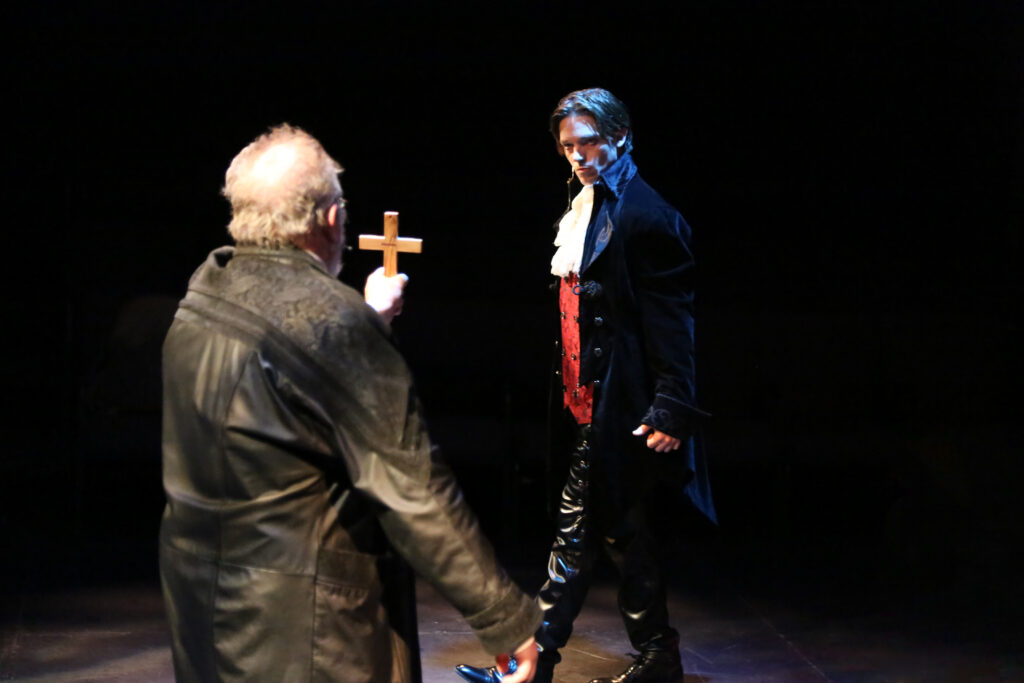
It’s important to be aware of the basic Dracula scenario, for this script has little world-building, assuming you’re well-versed in it.
The setting toggles back and forth between a castle in Transylvania, England, a ship, Budapest, and a mental asylum, which can be difficult to follow if you’re not plugged into the most famous vampire figure in history.
Black’s lyrics have more exposition than the book. Gutmann’s soulful voice stirringly delivers Wildhorn’s grandiose ballads, injecting a more tortured, troubled persona rather than a monstrous villain into the numbers.
And he does so admirably, from his first number “Solitary Man” to “At Last” and finale. His anguish and his power are explored in “A Perfect Life/Loving You Keeps Me Alive” with Kohl and McCreary, one of the standout numbers.
Lucy is doomed, and Simpson is impressive as the poor unfortunate soul. She and Gutmann display a palpable chemistry, and that may be chalked up to being partners in real life.
Their number, “Life After Life,” joined by the company, sets up the inevitable trajectory, and their harmonies are solid.
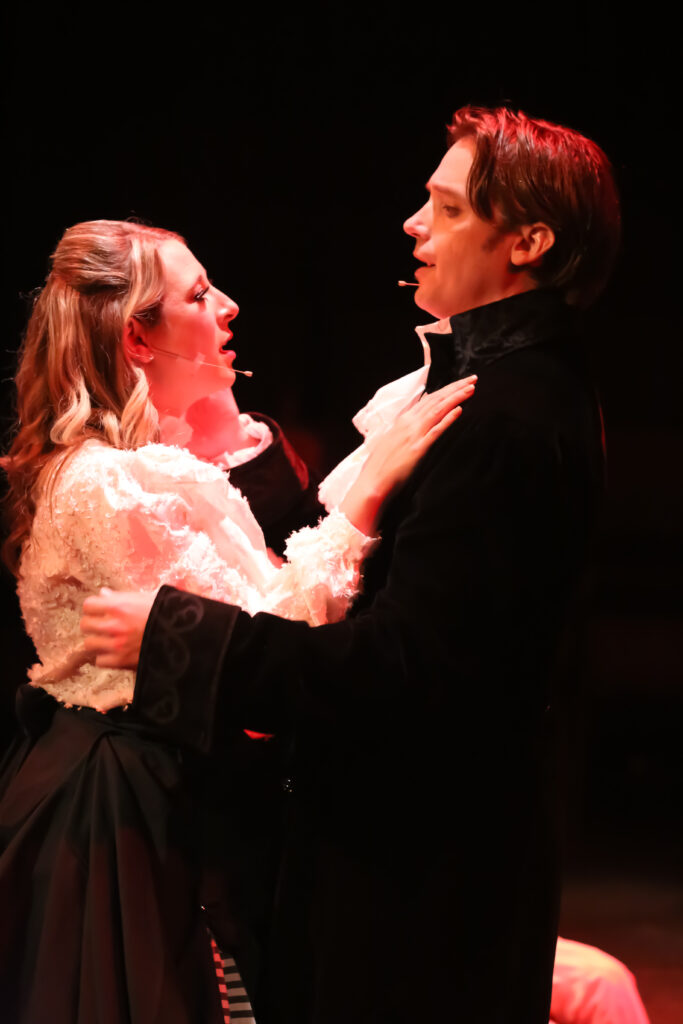
When Dracula falls in love with Mina, that allows for some outstanding vocal work by Kohl and Guttmann. Kohl is capable of pathos, as exemplified in “Please Don’t Make Me Love You” and “If I Had Wings.”
I wouldn’t say sensuality is evident, but as accomplished singers, they know how to deliver poignancy.
The designers have expertly crafted a creepy atmosphere, with Matt Stuckel’s lighting design and Ryan Day’s sound design establishing an off-balance feel.
Costume designer Zach Thompson has fashioned appropriate 19th century styles and sultry outfits for the Weird Sisters, with nifty little details to make the looks interesting..
Lippert’s skills have highlighted functionality for the scenic design, making the most with a few signature pieces – a centerpiece crypt doubles as a bed and a table and there is a striking stained glass window.
Music Director Jenna Lee Moore, who helmed “Nine” last year, has a terrific group of six musicians and plays keyboard. Paul Rueschhoff is on cello, John Gerdes on brass/bass, Mary Wiley on reeds, Mallory Golden on violin, Buddy Shumaker on guitar and second keyboard, and Clancy Newell on percussion.
Wildhorn is a hit-and-miss with me. When New Line spiffed up his “Bonnie and Clyde” in 2014, it was one of my favorites that year, showcasing top-notch performances and telling a compelling story.
He is the composer of both pop songs (“Where Do Broken Hearts Go” for Whitney Houston) and musicals, including his most famous, “Jekyll & Hyde” that ran for four years on Broadway. In 1999, he made history by having three shows run simultaneously – besides Jekyll & Hyde, “The Scarlet Pimpernel” and “The Civil War” were also on Broadway.
This musical version of “Dracula” isn’t as fascinating as one expects, given our knowledge of the story, and a reference base from more than 30 films based on the world’s most famous vampire. But this is a sturdy cast whose efforts are noteworthy.
You may not leave humming a tune or consider any of the songs as memorable as Wildhorn’s “This Is the Moment,” from “Jekyll and Hyde,” but you won’t forget the music New Line’s team made.
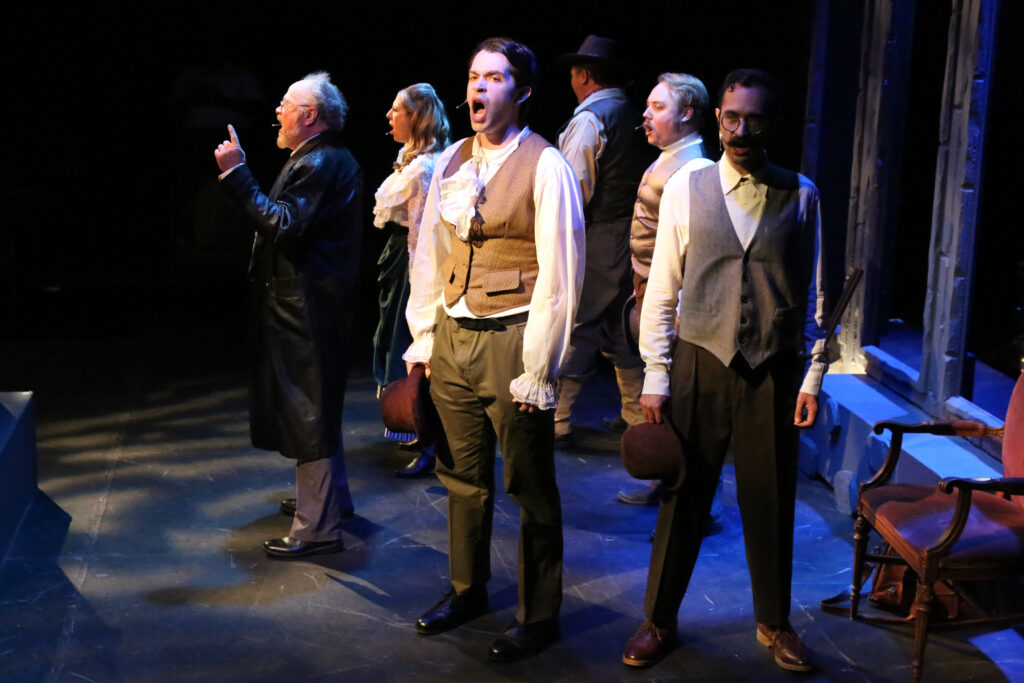
New Line Theatre” presents “Dracula” May 30 – June 22, Thursdays, Fridays and Saturdays at 8 p.m., at the Marcelle Theater, 3310 Samuel Shepard Drive, in the Grand Center Arts District. For more information, visit: https://www.newlinetheatre.com.
To charge tickets by phone, call MetroTix at 314-534-1111 or visit the Fox Theatre box office or the MetroTix website.
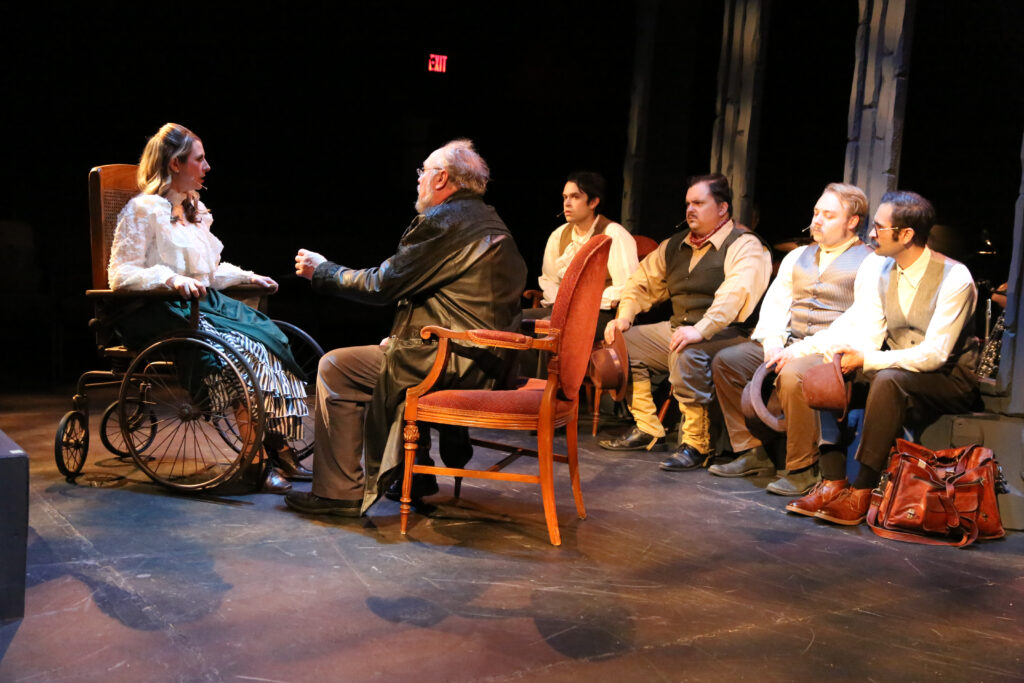

Lynn (Zipfel) Venhaus has had a continuous byline in St. Louis metro region publications since 1978. She writes features and news for Belleville News-Democrat and contributes to St. Louis magazine and other publications.
She is a Rotten Tomatoes-approved film critic, currently reviews films for Webster-Kirkwood Times and KTRS Radio, covers entertainment for PopLifeSTL.com and co-hosts podcast PopLifeSTL.com…Presents.
She is a member of Critics Choice Association, where she serves on the women’s and marketing committees; Alliance of Women Film Journalists; and on the board of the St. Louis Film Critics Association. She is a founding and board member of the St. Louis Theater Circle.
She is retired from teaching journalism/media as an adjunct college instructor.

